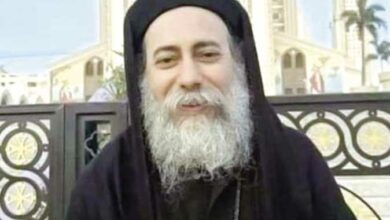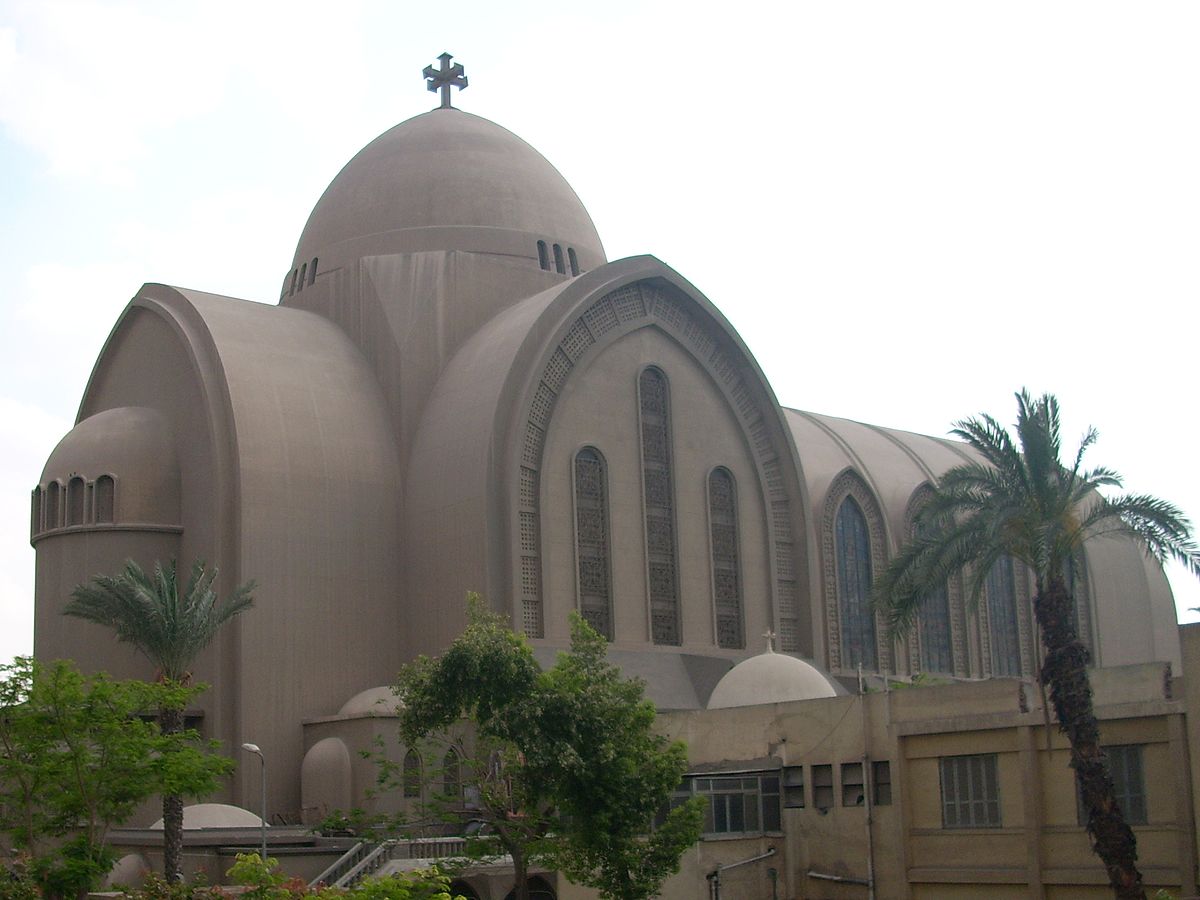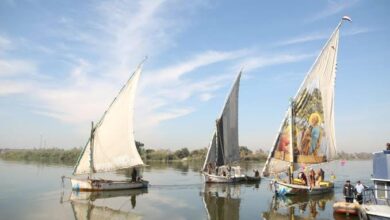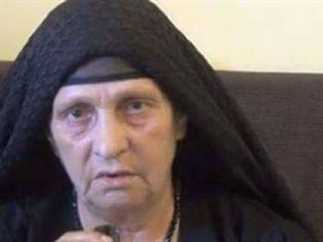Elections for the Coptic Orthodox Church’s 118th pope are under way at a time in which the role of the papacy is in turmoil.
Some Copts have balked against the church as their political representative and for what many see as passive support for the former regime. Others contest the church’s control of their personal life, particularly in matters of divorce and remarriage.
With a government led by Islamists, a new constitution in the cards and Christian-Muslim relations a matter of international debate, Copts are asked to choose a new leader in matters spiritual and, perhaps, temporal.
The process for electing a new pope is also highly politicized. Candidates — who must eventually secure the support of senior members of the church — are now able to position themselves through forms of mass media not available at the time of the previous pope’s election.
The process
A list of 17 nominees — 10 bishops and seven monks — was released last Thursday. An appeal period in which nominations may be challenged ends on 30 September. Thereafter, the Nominations Committee, chaired by the acting pope, will whittle the number down to between five and seven, based on criteria that are unclear.
The Nominations Committee includes nine bishops appointed by the Holy Synod, the highest authority in the church, and nine laypersons elected by the Millet Council, the 24-member secular body in charge of the church’s administrative affairs.
On 24 November, an electoral college of 2,410 will vote on the candidates. Finally, on 2 December, at St. Mark’s Coptic Orthodox Cathedral in Abbasseya, the top three nominees will have their names placed at the altar, where a blindfolded child will select the name of the next pope of the Coptic Orthodox Church from a ballot.
In an unprecedented move — despite its arguable violation of Canon law — the church decided to allow diocesan bishops to be eligible for the papal seat. This allowed diocesan bishops such as Bishop Bishoy, Bishop Baphnotious and Bishop Kirollos to nominate themselves.
According to Father Antonio Kaldas of St. Bishoy’s in Sydney, Australia, writing in an online statement, the exclusion of diocesan bishops in the past had functioned to protect the church from “the ravages of personal ambition.”
Bylaws passed in 1957 stipulate that candidates must be above 40 years old and have had a monastic life of at least 15 years. They must be endorsed by a minimum of six members of the Holy Synod or 12 members of the Millet Council.
Members of the electoral college must be members of the church’s General Congregation, formed of the Holy Synod and the Millet Council.
Voters must be older than 35 years and have a university degree. This year, the 2,410 members of the committee range from bishops and clerics to judges, lawyers and MPs. They live both within Egypt and abroad.
But not everyone believes the process is fair.
“The process is not democratic since not all members of the church can vote,” says activist Vivian Fouad.
Members of the group Copts Without Borders objected in a meeting with Bishop Morcos to limiting eligible voters to Copts with a certain financial status — namely, a salary of above LE400 per month.
“These laws are elitist and discriminate against the poor,” adds Fouad.
Activists such as Maged Mikhail have filed cases claiming that voter list is not a fair representation of the Coptic populace.
Some are concerned about bias toward candidates with greater media visibility.
Earlier this month, Bishop Pachomius, the acting patriarch, warned Coptic TV channels against being dragged into campaigning.
The five leading candidates
Bishop Bishoy
Bishop Bishoy, 70, is the secretary of the Holy Synod and the Metropolitan Bishop of Damietta, Kafr al-Sheikh, Barary and St. Damiana Monastery in the Nile Delta.
Bishoy is head of the Clerical Council for Church Trials and therefore has the power to supervise different dioceses that are vacant, and to punish bishops, as he has in Mahalla and Luxor.
Despite his unpopularity outside the church establishment, Bishoy is known as former Pope Shenouda III’s “right-hand” and has great support within the church.
He has repeatedly issued controversial statements. In 2011, he said that “Egypt is the land of Copts and Muslims are just visitors,” and criticized aspects of the Quran, later apologizing.
Moreover, in a statement issued earlier this year, he claimed that Christian women should learn from their veiled Muslim counterparts and dress conservatively. This caused some women to openly protest in response.
He has also famously cited rifts between different Christian denominations. He called the Evangelical Church “conquerors” that attract orthodox youth through evangelism, and deemed marriage with evangelicals “adultery.”
Hany Labib, managing director of the Center for Intercultural Dialogue & Translation, claimed in a report in March that Bishoy is “confrontational and strict.”
Fouad agrees with Labib.
“He is more conservative in his views, especially when it comes to women, other faiths and even other Christian denominations,” Fouad says.
Bishoy’s support for the succession of Gamal Mubarak, former President Hosni Mubarak’s son, to the presidency alienated him from progressive liberals.
A source from within the Coptic Orthodox Church who requested anonymity described Bishop Bishoy as undiplomatic and extreme in his ideas.
“He is not open-minded at all and even stirred problems with intellectuals such as writer Youssef Zidane,” the source says.
Bishop Youanis
Bishop Youanis, 42, was the former secretary to Shenouda and was ordained in St. Paul Monastery in the Red Sea Governorate. Youanis is very active in administering church affairs.
He has written a book named “On the Shores of the Spiritual Sea” and many short articles. He has also hosted TV shows on CTV, a satellite channel owned by businessman Tharwat Basil.
Many have claimed Youanis is humble and spiritual in his endeavors.
Activist Fouad says Youanis is a doctor and has often worked in social services.
“He has a background in development, especially in working with the poor in charity programs,” Fouad says. “His programs encompass charity work with the poor, whether Muslim or Christian, and youth in NGO training programs. He is a very spiritual person and his ideas are moderate. He is also very active for women’s rights and has campaigned against female genital mutilation.”
Labib claims Youanis has a “vibrant role in the Holy Synod. He is humble, has a clear vision and has solid relations with state bodies, which helped him overcome and solve many sectarian conflicts.”
On the media front, Labib claims CTV favors Bishop Youanis.
Others have claimed Youanis has close links with prominent businessmen and politicians and has worked to position himself for years to gain the papal throne.
The anonymous church source described Youanis as having been “maneuvering to take the role of pope for too long.”
Since the revolution, many revolutionary youth have protested his pro-regime political leanings.
In early May 2011, Youanis negotiated privately with the Supreme Council of the Armed Forces Major General Adel Emara in St. Mark’s Cathedral in an attempt to end a sit-in by the Maspero Youth Union, a Coptic group, outside the state TV building in downtown Cairo. The church called on the activists to return home and allow the bishops to negotiate a settlement with the SCAF behind closed doors.
Bishop Raphael
Dubbed the voice of the Coptic youth, Bishop Raphael, 54, is the general bishop of central Cairo. He assists Bishop Moussa, another youth favorite, in the administration of the Bishopric of Youth.
“He is very popular with youth as he has worked on several youth campaigns. He also organized several awareness conferences in Alexandria. He manages summer classes for children in music, sports, Bible studies and Christian rituals,” says Fady Youssef, co-founder of the Copts of Egypt Coalition.
“He mostly focuses on church liturgy and ecclesiastical teaching. He is low-profile in the media and public matters,” says Fouad. Youssef concurs.
Labib also agrees, describing Raphael as “dignified” and “quiet.”
“Bishop Raphael has very moderate and progressive views. He always focuses on Egyptians as a unified entity first and then on Coptic Christians,” the anonymous source says.
In 2007, Raphael argued in an interview with state-owned weekly newspaper Rose al-Youssef that the Coptic Orthodox Church is a religious rather than a political institution.
However, he is openly critical of Israel and stated in April that Copts are banned from doing pilgrimage to Jerusalem and that they should not visit the Holy Land “as long as it is named Israel.”
Bishop Baphnotious
Bishop Baphnotious, the 64-year-old bishop of Samalut and Taha al-Aameda, has been very active in the civil society sector by managing several development projects in hospitals and schools, as well as awareness campaigns.
Labib describes Baphnotious as having great managerial skills but a minimal media profile.
He adds that Baphnotious is reformist in his thinking, which is reflected in some of his published books.
“He created the idea of forming a high consulting council as an alternative for the current Millet Council in administrative affairs,” Labib says.
However, Bishop Baphnotious has had power struggles with other members of the Coptic Orthodox Church.
In 2007, tensions arose between him and Bishop Bishoy when Baphnotious nominated himself as secretary general of the Holy See of the Coptic Orthodox Church. Bishoy, the secretary general of the time, asked Pope Shenouda III to intervene.
Fouad sees this as an example of the church’s undemocratic, internal power plays.
Bishop Botrous
Bishop Botrous, 63, was Shenouda’s personal secretary. He managed schools such as Al-Karmah School, a bakery and a marble factory. He also founded Aghape, a popular TV satellite channel that has retained a mostly apolitical character.
His media presence is minimal, but he has occasionally been criticized for controversial statements, including one from 2004: “Spirits are full of hatred. Muslims and Christians are not good to each other — and it’s hard to correct.”
Botrous has stated that events in Palestine and Iraq, the headscarf ban in France and US hegemony in the region have sparked sectarian tensions.
This piece was originally published in Egypt Independent's weekly print edition.




